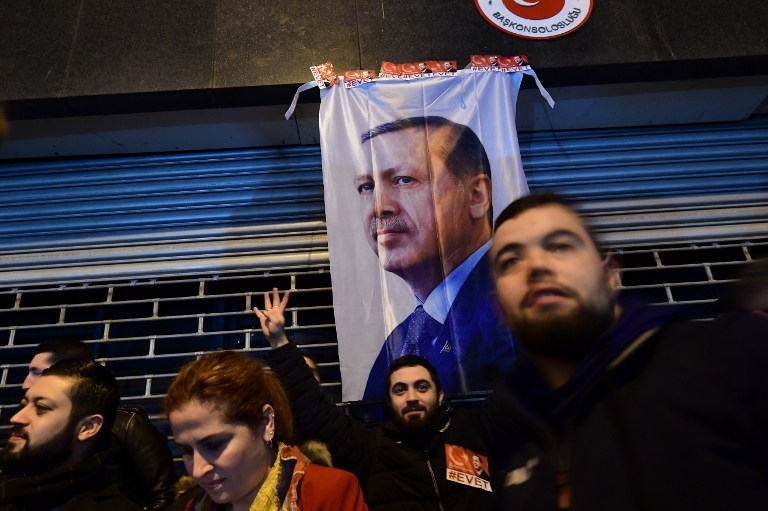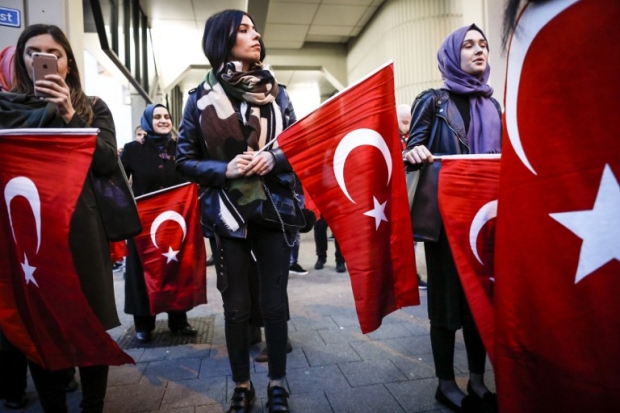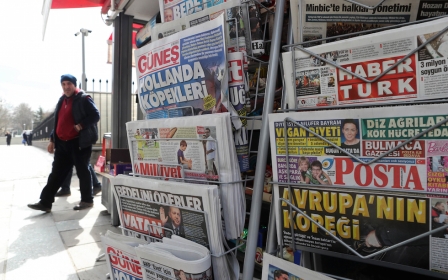Between Erdogan and Wilders, there are only losers in the Dutch 'Turkeyriot'

Turkish President Recep Tayyip Erdogan is dead set on winning the upcoming referendum, which will greatly enhance his powers, even if that means playing into the hands of Dutch nationalists and jeopardising the position of the Turkish minority in the Netherlands. That much is clear from the diplomatic incident that continues to rock relations between Ankara and The Hague.
With the outcome of Turkey’s constitutional referendum, scheduled for 16 April, still too close to call, the 63-year-old is keen to drum up support among Turkish voters abroad.
Allowing Turkey's Cavusoglu into the country would have been political suicide for the Dutch prime minister
For that reason, he requested that Holland allow Turkey’s foreign minister, Mevlut Cavusoglu, to speak at a protest in Rotterdam this past Saturday.
The Dutch government, however, kindly declined. “The Dutch public domain is not the ideal place for political campaigns of other countries,” said Prime Minister Mark Rutte.
Certainly not when such a campaign is set to take place only four days before the Dutch parliamentary elections, in which immigration and Islam are hot topics. Rutte did not really have a choice. Allowing Cavusoglu into the country would have been political suicide.
The government’s decision was supported across the political spectrum.
“The only just reply,” tweeted Sadet Karabulut, an MP of Turkish descent for the Dutch Socialist Party.
READ - Wild, wilder, Wilders: Meet Holland's very own Trump
“It is absurd for a country descending into dictatorial tendencies to campaign in The Netherlands,” said Alexander Pechtold, leader of the moderate Democrats 66 (D66) party.
In addition, Rotterdam’s mayor, Moroccan-born Ahmed Aboutaleb, feared a Turkish rally might lead to civil unrest in the harbour city, which is a hotbed of anti-immigration sentiments.
The strongman act
Bon, case closed you would think. But no. After the Dutch government withdrew permission for Cavusoglu’s plane to land, Erdogan asked Fatma Kaya, Turkey’s family affairs minister, who happened to be in Germany at the time, to head across the border to Rotterdam. By then, nearly a thousand flag-waving Dutch Turks had gathered outside the Turkish consulate there.
Kaya made it to Rotterdam. However, as no permission had been granted for the rally, Dutch police did not allow her to speak and, eventually, escorted her back to Germany. Naturally, the demonstrators were not pleased and the event ended in riots. Some 12 people were arrested.
For Erdogan, things arguably could not have ended in a better way. It allowed him to play his beloved strongman act and blow things totally out of proportion.
Potential no-voters have been called 'terrorists,' while the notion of the Netherlands and Germany as 'fascist' states feeds into the narrative of Turkey being an island surrounded by enemies
“I thought Nazism was over, but I was wrong,” he said at a rally in Istanbul. “In fact, Nazism is alive in the West.”
He made similar outrageous remarks a week earlier when the German authorities refused to grant permission for the Turkish minister of justice to address crowds in Germany. The reference to Nazism was particularly painful in the case of Rotterdam, a city that was bombed to smithereens by German planes in 1940.
Eric-Jan Zurcher, professor of Turkish studies at Leiden University, was not surprised by Erdogan’s heavy-handed response. “It’s been clear for a while that the referendum campaign to strengthen the role and position of the Turkish president has been extremely aggressive,’’ he told Dutch daily Financieel Dagblad.
Potential no-voters have been called “terrorists,” while the notion of the Netherlands and Germany as “fascist” states feeds into the narrative of Turkey being an island surrounded by enemies that only seek to weaken and divide the country.
Consequently, in order to safeguard the nation’s stability and survival, Turkey needs a strong leader.
Caught between extremes
Meanwhile, the Netherlands are caught up in their own political battles.
On 15 March, the country heads to the ballot box in what are the most contested elections in recent history. If polls are to be believed, nationalist Geert Wilders and his Freedom Party could gain up to one fifth of the vote.
Fiercely Islamophobic, Wilders calls for the closure of mosques and a ban on all Muslim immigrants. To him, Erdogan’s gimmick was like a gift from heaven and he wasted no time to steal the political limelight. The sea of Turkish flags in Holland’s second biggest city allowed him to question Dutch Turks’ loyalty to the country and sing his favourite song: “If you don’t like it here, go back to your own country.”
Dutch authorities have for many years turned a blind eye towards the activities of ultranationalist and religious Turkish groups such as the Grey Wolves and Mili Gorus
One of them is Fidan Ekiz, a journalist and filmmaker, who attended the events in Rotterdam last Saturday. In a column published two days later, she described how isolated she felt among Erdogan’s supporters, while at the same time knowing she would inevitably be associated with them.
“I feel cheated,” she wrote. “As a journalist, first as a correspondent in Turkey and now from the Netherlands, I’ve always fought against polarisation in the Netherlands and I’ve always tried to show the nuances in the representation of migrants, Dutch Turks and Turkey.”
The 'silent majority'
Suddenly it seems all her efforts were in vain. She blames Erdogan, of course, but also the Dutch authorities, who for many years have turned a blind eye towards the activities of ultranationalist and religious Turkish groups such as the Grey Wolves and Mili Gorus. The end result, wrote Ekiz, was on display in Rotterdam on Saturday.
And yet she has hope. Deep down, she knows she is not alone.
Everyone will be talking about the demonstrators in Rotterdam, yet they are not the norm. “We, the silent majority, will have to make our voice heard. We have a world to gain for the future, for our children,” she wrote.
I fear that, in these times of rising nationalism and populism, her words are not just true for Dutch Turks. It is the silent Dutch majority that will have make its voice heard on Wednesday, while the Turks will have to to do so come April. Let’s just hope words of wisdom will prevail.
- Peter Speetjens is a Dutch journalist who lived in Lebanon for 20 years, regularly travels to India and has a special interest in how 19th-century writers helped shape our conceptions of the world today.
The views expressed in this article belong to the author and do not necessarily reflect the editorial policy of Middle East Eye.
Photo: A man gestures in front of a flag bearing a portrait of Turkish President Recep Tayyip Erdogan as Turkish residents of the Netherlands gather for a protest outside Turkey's consulate in Rotterdam on 11 March 2017 (AFP)
New MEE newsletter: Jerusalem Dispatch
Sign up to get the latest insights and analysis on Israel-Palestine, alongside Turkey Unpacked and other MEE newsletters
Middle East Eye delivers independent and unrivalled coverage and analysis of the Middle East, North Africa and beyond. To learn more about republishing this content and the associated fees, please fill out this form. More about MEE can be found here.






